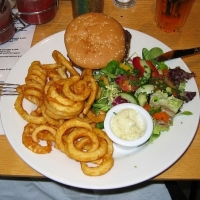Lose Weight > Weight Loss Tips > Weight Loss Articles > Losing Weight For Your Date? Dont Fall For The Wrong Diet
Losing Weight For Your Date? Dont Fall For The Wrong Diet
In the quest for a better body, the battle of the bulge, comes yet another quick fix diet book based on short term weight loss through high protein meals.
The Commonwealth Scientific and Industrial Research Organization's (CSIRO) Total Wellbeing Diet book entered the Australian market over a year ago and topped the best seller's list, dazzling the public with "scientifically proven" research.
Claiming to be not just a weight loss program, but also a diet plan for lifelong eating, the CSIRO
Total Wellbeing Diet has been criticised for a number of reasons.
The diet recommends 300 grams of meat per day of which is about double the quantity of meat recommended by other calorie controlled diets, not to mention the Australian government's own recommendation of consumption of 65 to 100 grams of meat three to four times per week.
But before even looking at the health ramifications of eating meat to an even lesser degree, it is most interestingly noted that the Meat and Livestock Industry and Dairy Australia funded the CSIRO's diet book.
No surprise then that beef, lamb, veal and dairy products all play a huge part in the make up of this meal plan.
Nutritionists Rosemary Stanton and Gyorgy Scrinis publicly criticised the CSIRO of prostituting itself to Australia's meat and dairy industries suggesting the science the diet is based on to be less than credible.
"The CSIRO's endorsement of a high-meat diet is perhaps an indication of the extent to which our scientists have taken on the role of consultants to industry in their bid to raise funds, and their willingness to deliver research findings that industry finds agreeable," Stanton and Scrinis stated.
For a so-called "scientific" diet, the biased recommendations seem to pay no heed to the surmounting research that diets too high in animal protein can lead to a number of serious disorders including heart disease, increased cholesterol levels, high blood pressure and cancer.
The China Study, regarded as the most comprehensive study of diet, lifestyle and disease ever completed, linked the Chinese population's low incidence of such Western health problems as obesity, diabetes, some cancers and cardiovascular disease to plant-based diets that were low in animal products.
Evidently the researchers of the CSIRO Total Wellbeing Diet didn't include the China Study in their research or chose to ignore it's facts when creating a diet plan so heavily based on animal products.
Research from this important study confirmed the following information:
- Plasma cholesterol in the 90-170 milligrams per decilitre range is positively associated with most cancer mortality rates. Plasma cholesterol is positively associated with animal protein intake and inversely associated with plant protein intake.
- For those at risk for liver cancer (for example, because of chronic infection with hepatitis B virus) increasing intakes of animal-based foods and/or increasing concentrations of plasma cholesterol are associated with a higher disease risk.
- Cardiovascular diseases are associated with lower intakes of green vegetables and higher concentrations of apo-B (a form of so-called bad blood cholesterol) which is associated with increasing intakes of animal protein and decreasing intakes of plant protein.
- Colorectal cancers are consistently inversely associated with intakes of 14 different dietary fiber fractions (although only one is statistically significant). Stomach cancer is inversely associated with green vegetable intake and plasma concentrations of beta-carotene and vitamin C obtained only from plant-based foods.
- Western-type diseases, in the aggregate, are highly significantly correlated with increasing concentrations of plasma cholesterol, which are associated in turn with increasing intakes of animal-based foods.
In addition to the irresponsible recommendation of a high animal protein diet, the book boasts of a "major" scientific study.
This "scientific" research was a single sex study conducted on a mere 100 women, for a period of only 12 weeks. Half of the group ate the researchers' preferred meat-centred, high protein and moderate carbohydrate diet.
The other half of the group was placed on a diet higher in carbohydrates in which some of the meat was replaced with pasta or rice.
It was noted that the two groups lost a statistically comparable amount of weight over the 12 weeks.
For the CSIRO diet book's researchers to claim that this study scientifically proves a high protein diet to be most effective is an embellishment of the research findings. For the record, I am not a vegetarian, all my meat sources though are organic and I try to limit red meat to twice a week.
I only had to really open one page of this book to realise its inadequacies. It actually recommended margarine to butter. I challenge any scientist to debate the health benefits of a trans fat over organic butter.
Although it is possible that short-term results may be achieved by following the CSIRO's Total Wellbeing Diet, it is evident that the serious health risks involved, especially in adapting the diet as an eating plan for life, outweigh the benefits this self-proclaimed leading dietary authority recommends.
The Commonwealth Scientific and Industrial Research Organization's (CSIRO) Total Wellbeing Diet book entered the Australian market over a year ago and topped the best seller's list, dazzling the public with "scientifically proven" research.
Claiming to be not just a weight loss program, but also a diet plan for lifelong eating, the CSIRO
Total Wellbeing Diet has been criticised for a number of reasons.
The diet recommends 300 grams of meat per day of which is about double the quantity of meat recommended by other calorie controlled diets, not to mention the Australian government's own recommendation of consumption of 65 to 100 grams of meat three to four times per week.
But before even looking at the health ramifications of eating meat to an even lesser degree, it is most interestingly noted that the Meat and Livestock Industry and Dairy Australia funded the CSIRO's diet book.
No surprise then that beef, lamb, veal and dairy products all play a huge part in the make up of this meal plan.
Nutritionists Rosemary Stanton and Gyorgy Scrinis publicly criticised the CSIRO of prostituting itself to Australia's meat and dairy industries suggesting the science the diet is based on to be less than credible.
"The CSIRO's endorsement of a high-meat diet is perhaps an indication of the extent to which our scientists have taken on the role of consultants to industry in their bid to raise funds, and their willingness to deliver research findings that industry finds agreeable," Stanton and Scrinis stated.
For a so-called "scientific" diet, the biased recommendations seem to pay no heed to the surmounting research that diets too high in animal protein can lead to a number of serious disorders including heart disease, increased cholesterol levels, high blood pressure and cancer.
The China Study, regarded as the most comprehensive study of diet, lifestyle and disease ever completed, linked the Chinese population's low incidence of such Western health problems as obesity, diabetes, some cancers and cardiovascular disease to plant-based diets that were low in animal products.
Evidently the researchers of the CSIRO Total Wellbeing Diet didn't include the China Study in their research or chose to ignore it's facts when creating a diet plan so heavily based on animal products.
Research from this important study confirmed the following information:
- Plasma cholesterol in the 90-170 milligrams per decilitre range is positively associated with most cancer mortality rates. Plasma cholesterol is positively associated with animal protein intake and inversely associated with plant protein intake.
- For those at risk for liver cancer (for example, because of chronic infection with hepatitis B virus) increasing intakes of animal-based foods and/or increasing concentrations of plasma cholesterol are associated with a higher disease risk.
- Cardiovascular diseases are associated with lower intakes of green vegetables and higher concentrations of apo-B (a form of so-called bad blood cholesterol) which is associated with increasing intakes of animal protein and decreasing intakes of plant protein.
- Colorectal cancers are consistently inversely associated with intakes of 14 different dietary fiber fractions (although only one is statistically significant). Stomach cancer is inversely associated with green vegetable intake and plasma concentrations of beta-carotene and vitamin C obtained only from plant-based foods.
- Western-type diseases, in the aggregate, are highly significantly correlated with increasing concentrations of plasma cholesterol, which are associated in turn with increasing intakes of animal-based foods.
In addition to the irresponsible recommendation of a high animal protein diet, the book boasts of a "major" scientific study.
This "scientific" research was a single sex study conducted on a mere 100 women, for a period of only 12 weeks. Half of the group ate the researchers' preferred meat-centred, high protein and moderate carbohydrate diet.
The other half of the group was placed on a diet higher in carbohydrates in which some of the meat was replaced with pasta or rice.
It was noted that the two groups lost a statistically comparable amount of weight over the 12 weeks.
For the CSIRO diet book's researchers to claim that this study scientifically proves a high protein diet to be most effective is an embellishment of the research findings. For the record, I am not a vegetarian, all my meat sources though are organic and I try to limit red meat to twice a week.
I only had to really open one page of this book to realise its inadequacies. It actually recommended margarine to butter. I challenge any scientist to debate the health benefits of a trans fat over organic butter.
Although it is possible that short-term results may be achieved by following the CSIRO's Total Wellbeing Diet, it is evident that the serious health risks involved, especially in adapting the diet as an eating plan for life, outweigh the benefits this self-proclaimed leading dietary authority recommends.
Related Articles
-
Does Fbf Diet Work
Can you believe someone who is neither a trainer nor a nutrition exper
-
10 Superfoods for Weight Loss
Make
-
Services Offered by Weight Loss Centers
There is a very slim chance for anyone in the todays era to have time
-
Lose Weight Programs: Finding One That Works For You
Many people become frustrated after trying many lose weight programs,
-
What You Should About Laxatives And Weight Loss
One popular weight loss supplements available in the market today take
-
Lose Weight with the Best Weight Loss Programs
Are you trying to lose weight? Sometimes weight loss can be diffic
- DON'T MISS
- Developing Visual Pictures And Weight loss - Start To See The Fat Reduced
- Fat Loss Diet Pills and Fat Cat Doctors - The Blaring Disconnect
- Main ideas for losing abdominal fat effectively
- Weight Loss: How to Get Rid of Excess You
- Best rapid weight loss pills
- 10 Pantry Staples for Quick-and-Easy Healthy Meals
- Fight Harmful Effects Of Weight Loss On Your Skin!
- Tacfit Commando Does It Work
- Doctor, Why Cant I Loose Weight and by the Way Why Do I Feel Sick?
- Why You Can’t Shed 10 Pounds in Two Days




